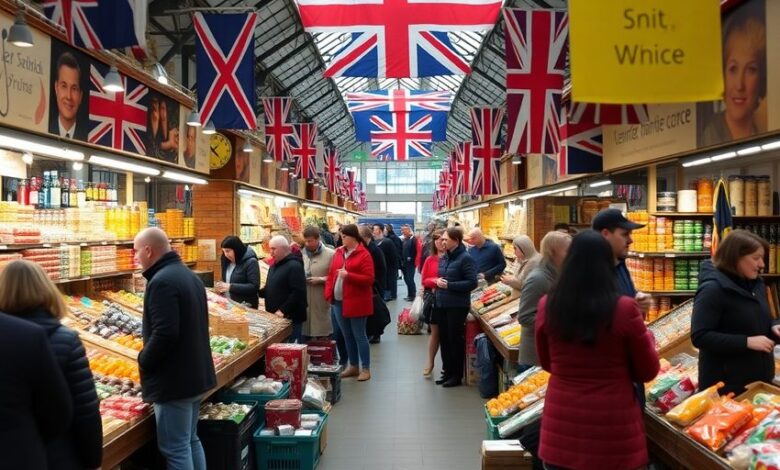
As we look ahead to 2025, it’s important to consider how Trump’s tariffs might impact businesses and consumers in the UK. With the ongoing trade tensions and evolving economic landscape, understanding the potential consequences of these tariffs is crucial for everyone, from large corporations to everyday shoppers. Let’s break down what these tariffs could mean for the UK economy and its people.
Key Takeaways
- UK businesses, especially exporters, may face significant challenges due to increased costs.
- Consumers could see fluctuating prices on goods, with some items possibly becoming more expensive.
- The UK government may implement counter-tariffs, further complicating trade dynamics.
- Certain sectors like automotive and pharmaceuticals are particularly vulnerable to tariff impacts.
- Long-term economic growth could be affected, with potential job losses and shifts in investment trends.
Economic Impact on UK Businesses

Potential Job Losses in Export Industries
Okay, so Trump’s tariffs are a thing, and they could really mess with UK businesses, especially those that send stuff to the US. We’re talking about companies that make cars, medicine, and machines. If the US slaps a tax on these goods, American companies might not want to buy them anymore. And if that happens, UK companies could see their profits drop. The worst part? They might have to lay people off if they can’t find other buyers. It’s a domino effect that starts with tariffs and ends with folks losing their jobs. According to some reports, industries like car manufacturing are particularly at risk.
Effects on Small and Medium Enterprises
Small and medium-sized enterprises (SMEs) are the backbone of the UK economy, but they’re also super vulnerable to changes in trade. Unlike big corporations, SMEs often don’t have the resources to deal with new tariffs or find new markets quickly. If Trump’s tariffs make it harder for them to sell to the US, they might struggle to stay afloat. This could lead to closures and a decrease in overall economic activity. It’s not just about the individual businesses; it’s about the whole community that relies on them.
Changes in Supply Chain Dynamics
Tariffs can really throw a wrench into how companies get their stuff. A lot of UK businesses rely on materials from other countries to make their products. If the cost of those materials goes up because of tariffs, it can make everything more expensive. Companies might have to find new suppliers, which can be a pain, or they might have to raise their prices, which can turn off customers. It’s all about how these businesses adapt to the changing landscape.
The tariffs could force UK businesses to rethink their entire supply chain. This might mean sourcing materials locally or finding new international partners. Either way, it’s a big adjustment that could take time and money.
Consumer Price Fluctuations
How Tariffs Affect Retail Prices
Okay, so, tariffs. Basically, when the UK gets slapped with tariffs on goods going into the US, it’s like adding a tax. Businesses that import stuff into the US end up paying it. And guess who usually ends up footing the bill? You guessed it, the consumer. Companies often pass those extra costs onto us in the form of higher prices at the store. It’s not always immediate, but it’s a pretty common thing that happens. The movie ratings hub can help you decide if going to the cinema is still worth it.
Impact on Imported Goods
Think about all the stuff we buy that comes from other countries. Clothes, electronics, even some of our food. If those goods are hit with tariffs, they’re going to get more expensive. The strength of the pound also plays a big role here. If the pound is weak against the dollar, imports already cost more. Add tariffs on top of that, and you’re looking at a double whammy. It’s not just luxury items either; everyday stuff can see a price hike.
Potential for Price Increases in Essential Items
This is where it really hits home. We’re not just talking about fancy gadgets or designer clothes. Tariffs can affect the price of essential items like food, medicine, and fuel. If the cost of importing these things goes up, it can put a strain on household budgets. Especially for families who are already struggling to make ends meet. It’s a ripple effect – higher prices for essentials mean less money for other things, and that can impact the whole economy.
It’s worth remembering that the situation is complex. Sometimes, companies might absorb some of the tariff costs to stay competitive, or other countries might step in to fill the gap in the market. But generally, tariffs tend to push prices up, at least in the short term.
Here’s a quick look at how tariffs might affect different types of goods:
- Food: Higher prices for imported fruits, vegetables, and processed foods.
- Clothing: Increased costs for clothes made overseas.
- Electronics: More expensive smartphones, laptops, and other gadgets.
- Medicine: Potential price hikes for imported drugs and medical supplies.
Changes in Trade Relationships
UK’s Response to US Tariffs
So, the US slaps tariffs on UK goods. What’s next? Well, the UK government has a few options, none of them particularly fun. They could try to negotiate with the US, but let’s be real, that might not go anywhere fast. Another option is to file a complaint with the World Trade Organization (WTO), but that process can take ages. The most immediate thing they’ll probably do is assess the damage and figure out which industries are going to get hit the hardest. It’s a bit of a waiting game, seeing how the tariffs are calculated and what the actual impact will be before making any big moves.
Shifts in Export Markets
If the US market becomes less attractive because of tariffs, UK businesses will have to look elsewhere. This means finding new customers in other countries. Europe is an obvious choice, but there’s also Asia, South America, and Africa to consider. It’s not as simple as just switching markets, though. Companies need to adapt their products, marketing, and distribution to suit the needs of these new customers. This could involve significant investment and a bit of a learning curve.
- Finding alternative markets.
- Adapting products for new markets.
- Establishing new distribution networks.
Impact on Trade Agreements
Trump’s tariffs could throw a wrench into existing and future trade agreements. If the UK caves to US pressure, it might upset other trading partners. It also makes negotiating new deals a lot trickier. Other countries might be hesitant to make agreements with the UK if they think the UK is just going to cave to the US at the first sign of trouble. It’s a delicate balancing act, trying to maintain good relationships with everyone while protecting its own interests.
The UK’s trade agreements are now more important than ever. They need to diversify their trade relationships to reduce reliance on the US market. This will require a strategic approach to trade negotiations and a willingness to explore new opportunities.
Sector-Specific Consequences
Okay, so let’s break down how these tariffs could mess with specific industries here in the UK. It’s not going to be pretty for everyone, that’s for sure.
Automotive Industry Vulnerabilities
The automotive industry is staring down the barrel of some serious problems. We send a ton of cars to the US, and these tariffs are like throwing a wrench in the whole operation. Jaguar Land Rover, for example, already paused shipments earlier this year to figure out what’s going on with these “new trading terms”.
- Potential job losses if exports drop.
- Increased costs for UK manufacturers.
- Possible shift in focus to other markets.
Pharmaceutical Trade Risks
The pharmaceutical industry is another big one to watch. The US is a massive market for UK pharma companies, like AstraZeneca and GSK. While raw ingredients are moving between the UK, EU, and US, any disruption could cause major headaches. Luckily, pharmaceuticals have been exempted from a 10% tariff set to come into effect on 9 April.
Effects on Agriculture and Food Products
Agriculture and food products are also in the crosshairs. Imagine tariffs on things like Scotch whisky or certain cheeses. It’s not just about the fancy stuff, though. It could affect everyday food prices too. If the UK government decides to retaliate with tariffs of its own on US goods entering the UK, there is a risk UK prices could rise if British businesses pass on extra costs to customers. Here’s a quick look at potential impacts:
- Reduced export competitiveness.
- Increased prices for consumers.
- Potential for retaliatory tariffs from the US.
These tariffs could really shake things up. It’s not just about big corporations; it’s about the farmers, the factory workers, and everyone in between. We need to keep a close eye on how this unfolds and be ready to adapt. Maybe exploring remote education jobs could be a good backup plan for some folks if things get really tough.
Currency Exchange Rate Variations
Impact on the Pound’s Value
Trump’s tariffs could really throw a wrench into the value of the pound. If the tariffs cause economic uncertainty, investors might start pulling their money out of the UK, which would weaken the pound. A weaker pound makes imports more expensive, which can lead to inflation. It’s a bit of a domino effect, and nobody wants to see their money worth less.
Effects on Import Costs
If the pound takes a hit, UK businesses importing goods and raw materials are going to feel it. A weaker pound means it costs more to buy things priced in dollars or other stronger currencies. This increase in import costs could then be passed on to consumers in the form of higher prices. It’s a classic case of businesses trying to maintain their profit margins in the face of rising expenses. The business lookup in Michigan might help you find alternative suppliers.
Consumer Purchasing Power
Ultimately, all of this boils down to how much stuff people can actually afford to buy. If the pound weakens and import costs rise, consumers will likely see higher prices on everything from groceries to electronics. This erodes their purchasing power, meaning they can buy less with the same amount of money. It’s a squeeze on household budgets that nobody welcomes.
Here’s a quick look at how this might play out:
- Pound weakens against the dollar.
- Import costs for UK businesses increase.
- Retailers raise prices to cover their costs.
- Consumers have less money to spend.
It’s a cycle that can impact the entire economy. The Bank of England might step in to try and stabilize things, but it’s a tricky situation with no easy answers.
Long-Term Economic Projections

Forecasting Economic Growth
Okay, so looking ahead, things get a little murky. Predicting the future is hard, right? But we can look at some likely scenarios. If Trump’s tariffs stay in place, or even get worse, we’re probably looking at slower economic growth in the UK. It’s not just about the direct impact of tariffs; it’s also about the uncertainty they create. Businesses don’t like uncertainty, and they tend to hold back on investments when they don’t know what’s coming. This can lead to a slowdown. The Bank of England might feel compelled to act to boost sentiment. Interest rates could be cut more aggressively than initially anticipated to try and stimulate the economy, but that’s a balancing act.
Potential for Recession
Could tariffs lead to a recession? It’s not impossible. A lot depends on how the UK responds and how other countries react. If there’s a full-blown trade war, where everyone is slapping tariffs on everyone else, then yeah, a recession becomes a real possibility. The impact of tariffs on global trade could trigger a significant downturn. It’s like a domino effect: tariffs hurt exports, businesses cut back, people lose jobs, and consumer spending declines.
Impact on Investment and Innovation
Tariffs can also mess with investment and innovation. Why would a company invest in new equipment or research if they’re not sure they can sell their products abroad? It just doesn’t make sense. Plus, tariffs can make it more expensive to import the components needed for innovation. This could put UK businesses at a disadvantage compared to companies in countries that aren’t subject to the same tariffs. It’s a drag on progress, plain and simple.
The long-term effects of these tariffs are complex and interconnected. It’s not just about the immediate price increases; it’s about the ripple effects throughout the economy. We need to consider how businesses will adapt, how consumers will respond, and how the government will react. It’s a waiting game, but we need to be prepared for a range of outcomes.
Government Policy Responses
Possible Retaliatory Tariffs
If the US tariffs continue to negatively impact the UK economy, the government might consider implementing retaliatory tariffs on US goods. This is a tricky situation, though. Retaliation could escalate the trade war, potentially hurting both economies even more. It’s a balancing act between protecting domestic industries and avoiding further economic disruption. The government would need to carefully assess which sectors to target to maximize impact on the US while minimizing harm to UK consumers and businesses. It’s a game of chess, really.
Support for Affected Industries
To soften the blow of the US tariffs, the government could introduce support measures for industries hit hardest. This could include:
- Financial aid, such as grants or loans, to help businesses stay afloat.
- Tax breaks to reduce the financial burden on struggling companies.
- Assistance with finding new export markets to diversify away from the US.
- Training programs to help workers in affected industries reskill and find new jobs.
The goal is to provide a safety net for businesses and workers while they adjust to the new trade landscape. It’s about helping them adapt and become more resilient in the face of these challenges.
Economic Stimulus Measures
To counteract the potential slowdown caused by the tariffs, the government might implement broader economic stimulus measures. This could involve:
- Increasing government spending on infrastructure projects to boost demand and create jobs.
- Cutting taxes to encourage consumer spending and business investment. For example, businesses can look into online banking to maximize financial efficiency.
- Lowering interest rates to make borrowing cheaper and stimulate economic activity. The Bank of England would play a key role here, carefully balancing the need to support growth with the risk of inflation.
These measures aim to inject some life into the economy and prevent a deeper downturn. It’s like giving the economy a shot in the arm to keep it going strong. The effectiveness of these measures will depend on how severe the impact of the tariffs is and how well the government targets its interventions. It’s a complex puzzle with many moving parts.
Final Thoughts on Trump’s Tariffs and Their Impact
In the end, Trump’s tariffs could shake things up for UK businesses and consumers in 2025. Prices might go up, but there’s also a chance they could drop if companies shift their focus to markets without heavy tariffs. The job market could feel the pinch too, especially in industries that rely on exports to the US. It’s a mixed bag of potential outcomes, and the real effects will depend on how businesses adapt and how the UK government responds. Keeping an eye on these changes will be key for anyone looking to understand their financial landscape in the coming years.
Frequently Asked Questions
What are tariffs and why are they used?
Tariffs are taxes that countries put on goods coming from other countries. They are used to make imported goods more expensive, which can help local businesses.
How will Trump’s tariffs impact UK businesses?
UK businesses that sell products to the US may face higher costs. This could lead to fewer sales and even job losses if they cannot find new customers.
Will prices in the UK go up because of these tariffs?
Prices might go up if UK businesses pass on the extra costs to consumers. However, some prices could also go down if businesses try to keep customers by lowering prices.
How might these tariffs affect consumers in the UK?
Consumers in the UK might pay more for some imported goods, especially if the value of the pound falls. This could make everyday items more expensive.
What could the UK government do in response to US tariffs?
The UK government might impose its own tariffs on US goods or provide support to businesses that are affected by the US tariffs.
What are the long-term effects of these tariffs on the economy?
In the long run, tariffs could slow down economic growth and lead to less investment in businesses. This might also hurt innovation and job creation.



